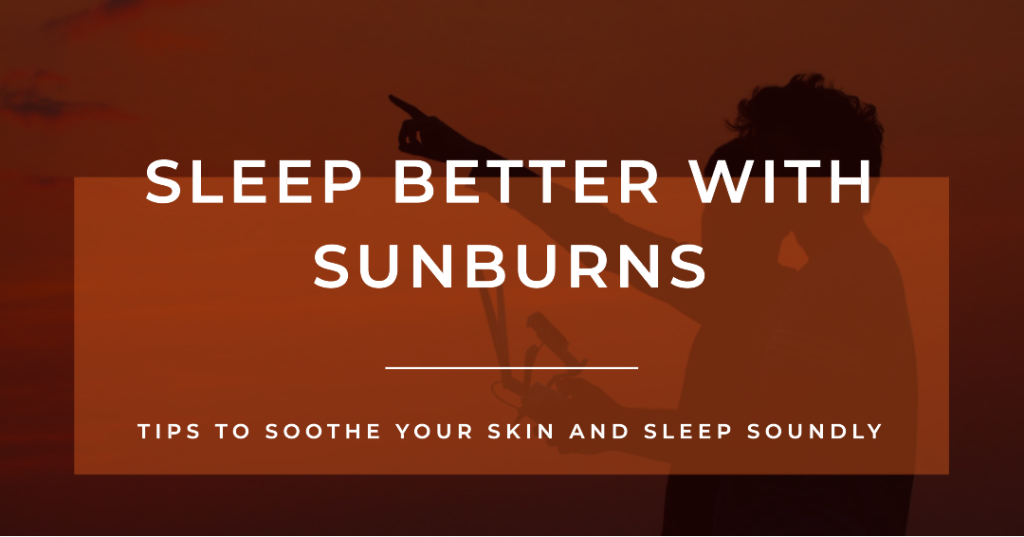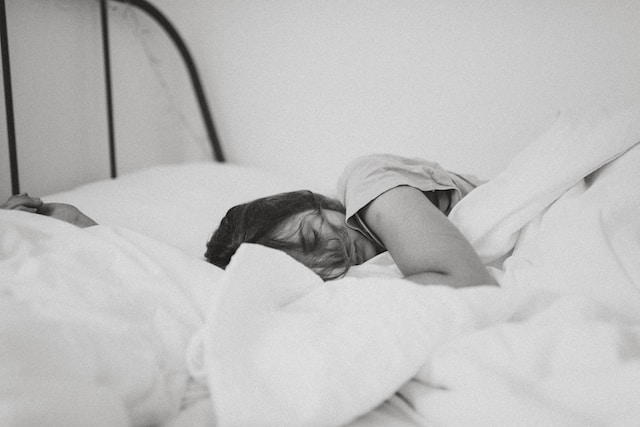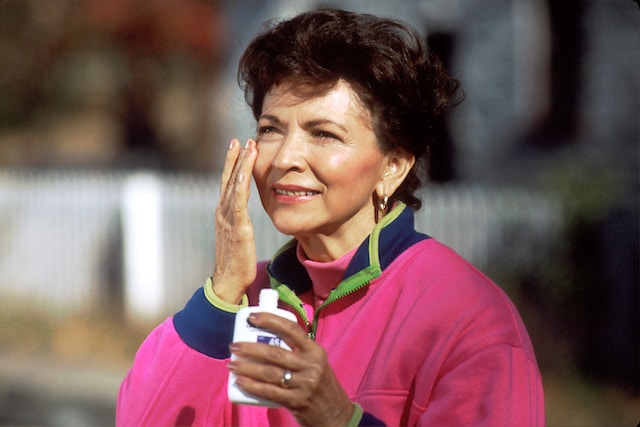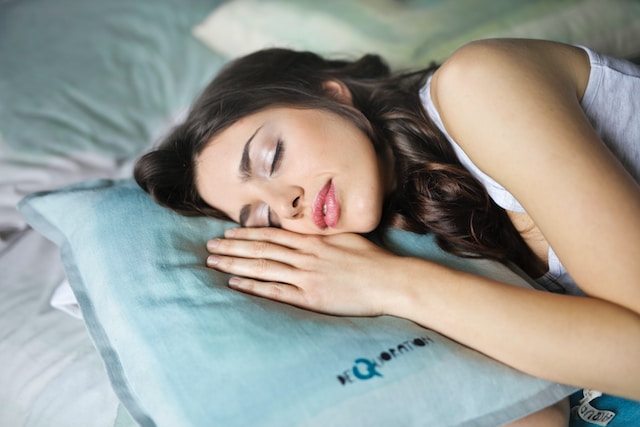Do you know that sunburns not only harm your skin but can also disrupt your sleep? When you get sunburned, your skin cells suffer DNA damage, causing inflammation and redness. If you have fair skin with less melanin, you’re more susceptible to sunburns and skin cancer. Excessive sun exposure messes with your body’s temperature regulation, hydration, and blood composition, leading to fatigue.

While sunlight helps regulate sleep through vitamin D, too much sun exposure can throw off your sleep physically and hormonally. To avoid discomfort and sleep disruption, learn how to prevent sunburns and cool your skin using protective clothing, sunscreen, cold compresses, aloe vera gel, and cool showers. By taking care of your skin, you can improve your sleep quality and have better sleep with sunburns.
Don’t forget to stay hydrated throughout the day, but avoid excessive water intake before bed to prevent nighttime bathroom breaks.
Related Post: 10 Foods Rich in Melanin for A Healthy Skin
Key Takeaways: Better Sleep With Sunburns
- Sunburns can lead to discomfort and disrupt sleep, making it difficult to fall asleep and stay asleep.
- Overexposure to the sun can result in long-term consequences such as premature aging, wrinkles, sunspots, and even skin cancer.
- Preventing sunburns through sun protection measures is crucial for maintaining sleep patterns and overall health.
- Hydration is important for both sunburn recovery and sleep, as sunburns can lead to fluid loss and fatigue. However, it’s important to avoid excessive water intake before bed to prevent interrupted sleep due to frequent bathroom visits.
Understanding the Impact of Sunburns on Sleep
Avoiding sunburns is crucial for getting a restful night’s sleep. The discomfort and dehydration from sunburns can disrupt your sleep and lead to long-term sleep debt. Sunburn not only affect the quality of your sleep but also the duration. When you have a sunburn, lying on the burned skin or having sheets touch it can make it difficult to fall asleep. The discomfort can keep you awake and prevent you from getting the rest you need.

Additionally, sunburns can lead to increased water intake and frequent bathroom visits at night due to dehydration. Poor temperature regulation caused by sunburns can also disrupt your sleep, especially if your body struggles to reach the optimal sleep temperature.
Preventing Sunburns for Better Sleep
Stay protected from harmful UV rays by wearing sunscreen and covering up with protective clothing, ensuring a better chance of getting a good night’s rest. Here are some tips to prevent sunburns and promote better sleep:
- Choosing the right sunscreen: effectiveness and application
- Look for broad-spectrum sunscreens with SPF 30 or higher.
- Apply sunscreen generously 15 minutes before sun exposure.
- Reapply every two hours, or more frequently if swimming or sweating.

- Natural remedies for sunburn relief: Aloe vera vs. cold compresses
- Aloe vera gel or cream moisturizes and cools the skin.
- Apply cold compresses or ice wrapped in a cloth to reduce swelling and pain.
- Stay in the shade and wear protective clothing
- Avoid the sun between 10 a.m. and 2 p.m.
- Wear long sleeves, hats, and sunglasses to shield your skin from UV rays.
Cooling Techniques for Sunburn Relief and Improved Sleep
There are many ways to soothe your sunburns naturally. Apply aloe vera gel or cream to your sunburned skin to moisturize, soothe, and cool it for relief and improved sleep. Aloe vera is a natural remedy that has been used for centuries to treat burns and promote healing.
It contains anti-inflammatory properties that reduce redness and swelling, while its moisturizing effects help prevent dryness and peeling.
By applying aloe vera to your sunburned skin, you can provide much-needed relief and create a soothing sensation that can aid in better sleep.
Sunburns can disrupt sleep quality due to discomfort, dehydration, and poor temperature regulation. By treating your sunburn with aloe vera, you can alleviate these symptoms and improve your sleep for a more restful night.
There are some foods that can promote better sleep even if you are suffering from sunburn. Try foods like kiwi and tart Cherries before going to bed for a healthy sleep at night.
Overcoming Sleep Disruptions Caused by Sunburns
To overcome the sleep disruptions caused by sunburns, you can try using cool compresses or taking cool showers to alleviate discomfort and promote better rest. Here are some tips to help you relieve the pain and avoid the consequences of sleep debt:

- Apply aloe vera gel or cream to moisturize, soothe, and cool the skin.
- Use cold compresses or ice wrapped in a cloth to relieve pain and reduce swelling.
- Take cool showers without scrubbing or using astringent cleaners.
Relieving the pain caused by sunburns is essential for a good night’s sleep. The discomfort from lying on burned skin or having sheets touch it can make it difficult to fall asleep. Moreover, poor sleep quality due to sunburns can accumulate sleep debt, which can have long-term consequences on your overall health and well-being.
Importance of Sunburn Prevention for Healthy Sleep Habits
Wearing protective clothing and seeking shade during peak sun hours can significantly reduce the risk of sunburn and help promote healthy sleep habits. Sunburns not only cause immediate discomfort but also have long-term effects on overall health.
When skin cells are damaged by the sun’s UV rays, it can lead to inflammation and redness. Tanning may seem like a harmless effect, but it actually indicates damaged and dying cells. Fair-skinned individuals with less melanin are particularly prone to burns and skin cancer.
In addition to the physical impact, sunburns can disrupt sleep patterns. Sleep plays a crucial role in skin repair and rejuvenation. Melatonin levels rise when the sun goes down, signaling sleep time, while hormone levels rise with the sun, signaling wakefulness.
Therefore, it is important to protect your skin from sunburns to maintain healthy sleep habits and support skin health.
Hydration Strategies for Restful Nights After Sunburns
To ensure you stay hydrated and promote better sleep after experiencing a sunburn, it’s important to replenish electrolytes throughout the day. Here are some strategies to help you on your way:

- Drink plenty of fluids: Hydrate your body by drinking water, herbal tea, or electrolyte-rich beverages to replace lost fluids.
- Eat hydrating foods: Incorporate water-rich fruits and vegetables into your diet, such as watermelon, cucumbers, and oranges.
- Avoid caffeine and alcohol: These can dehydrate your body and disrupt your sleep. Stick to water and non-caffeinated herbal teas.
By following these strategies, you can help your body recover from the effects of a sunburn and promote better sleep.
Remember to also practice good sleep hygiene, such as keeping a cool and dark sleep environment, avoiding stimulating activities before bed, and establishing a regular sleep schedule.
Taking care of your body’s hydration needs and practicing good sleep habits are key in maintaining overall health and well-being.
Frequently Asked Questions
Can Sunburns Affect the Quality of Sleep?
Yes, sunburns can affect your sleep quality. The discomfort, pain, and dehydration from sunburns can make it difficult to fall asleep and stay asleep. Using sunburn relief and sleep aids can help.
How Can Sunburns Disrupt the Body’s Natural Sleep Patterns?
Sunburns can mess with your body’s natural sleep patterns. They mess with the production of melatonin, the sleep hormone. Plus, they disrupt the sleep-wake cycle. So, protect your skin to get better sleep!
Are There Any Specific Sleep Positions That Can Help Alleviate Discomfort From Sunburns?
Sleep positions and relief methods can help alleviate discomfort from sunburns. Try sleeping on your back or side with a pillow for support. Apply aloe vera gel or use cold compresses for soothing relief.
Can Sunburns Lead to Long-Term Sleep Problems or Insomnia?
Yes, sunburns can lead to long-term sleep problems or insomnia. The discomfort, dehydration, and temperature regulation issues caused by sunburns can disturb sleep. Prevention is key to avoiding these effects.
Does Getting Sunburned During the Day Affect the Body’s Ability to Fall Asleep at Night?
Getting sunburned during the day can affect your ability to fall asleep at night. Sunburned skin can be uncomfortable, and the pain and discomfort can lead to sleep deprivation.
Conclusion
In conclusion, taking care of your skin after sun exposure is essential for a good night’s sleep. Remember, ‘an ounce of prevention is worth a pound of cure.’
By following sunburn prevention tips, such as avoiding peak sun hours, wearing protective clothing, and using sunscreen, you can protect your skin and promote better sleep.
Additionally, cooling techniques like cold compresses and aloe vera gel can provide relief for sunburned skin, leading to improved sleep quality.
Stay hydrated throughout the day to combat fatigue and dryness, but avoid excessive water intake before bed to prevent disruptions.
Prioritizing sunburn prevention is crucial for maintaining overall health and reducing the risk of long-term consequences like skin cancer.
So, take care of your skin, and enjoy restful nights of sleep.